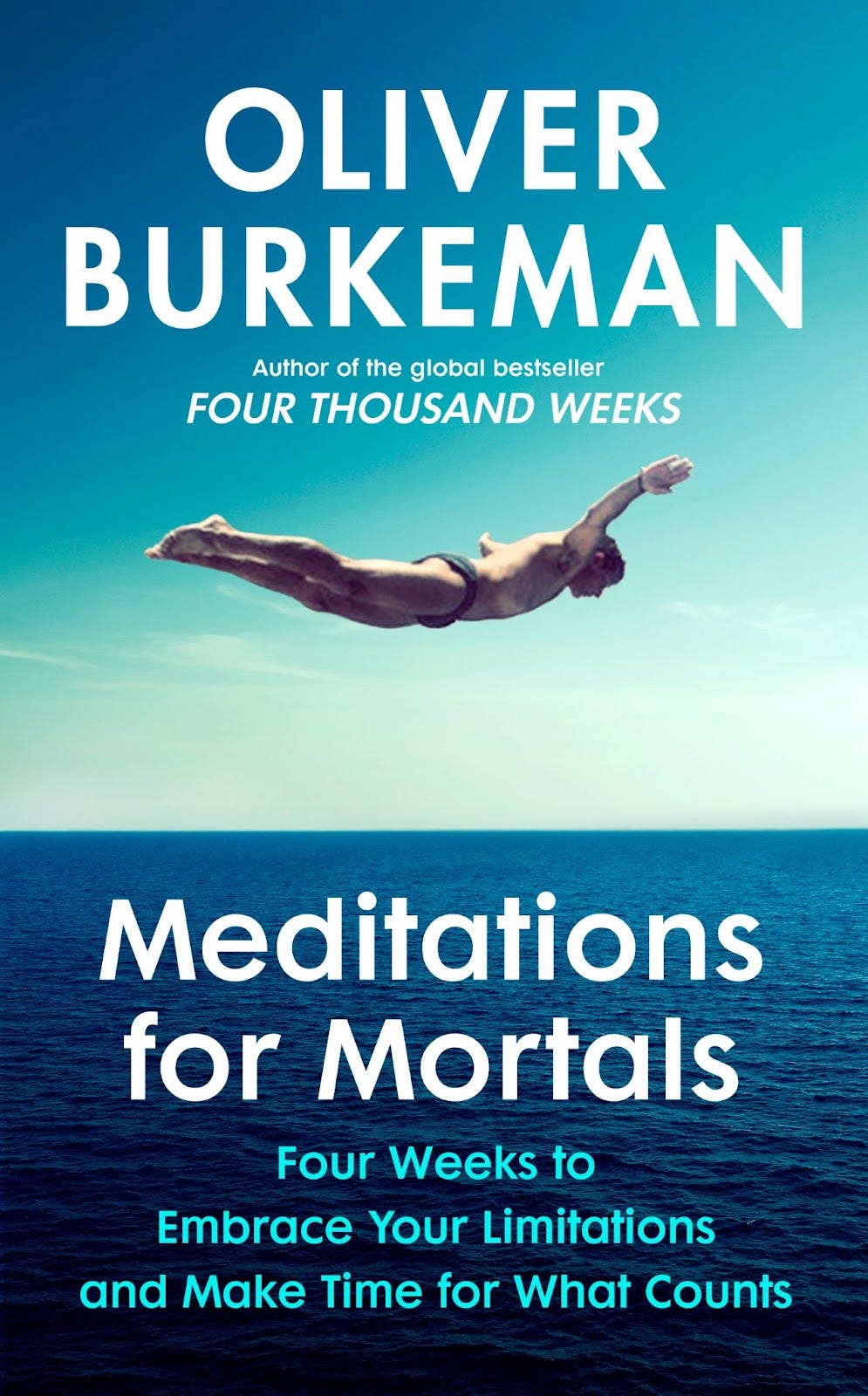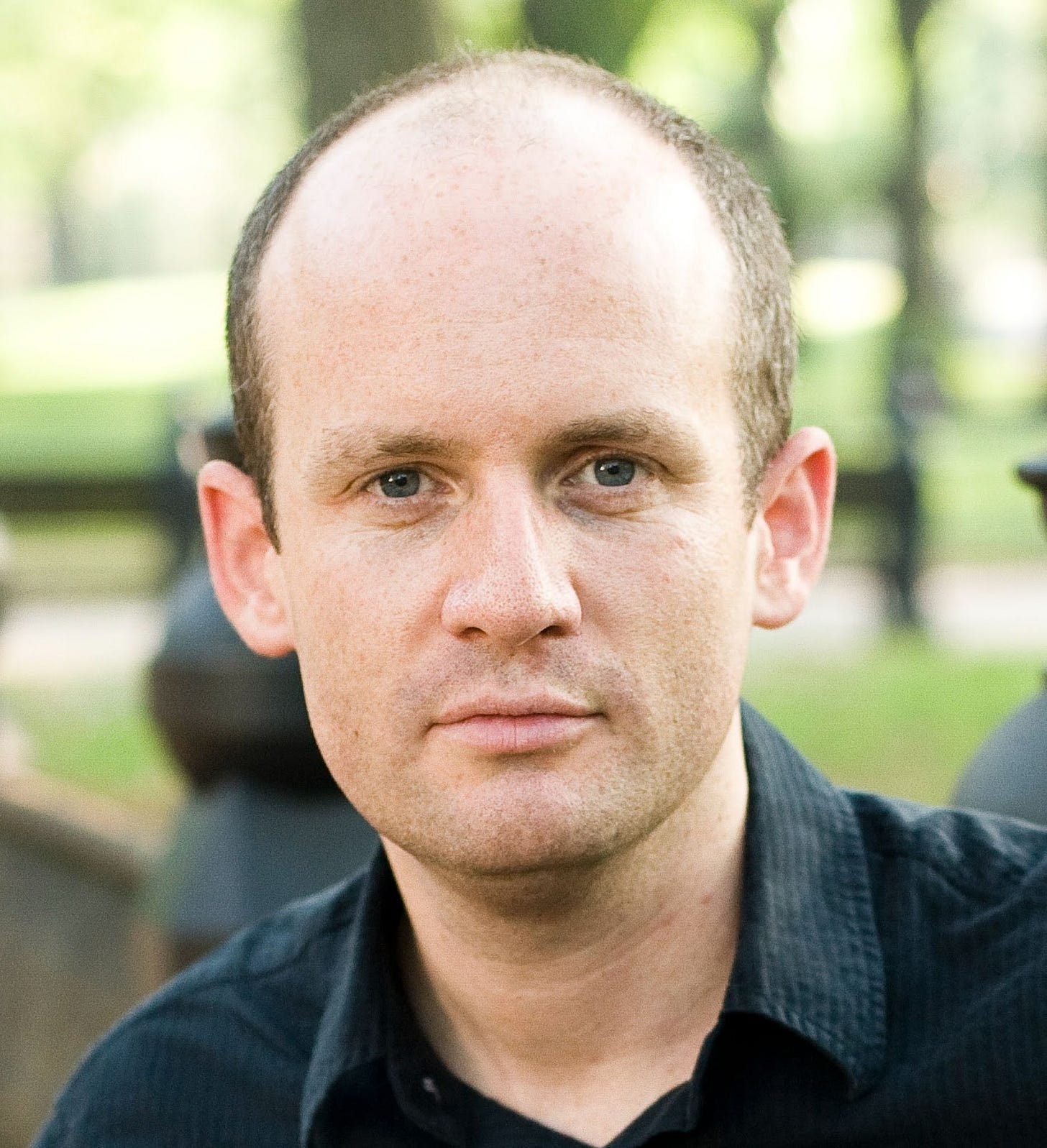Reading Guide: Meditation for Mortals by Oliver Burkeman
September's Book Club pick with an extract to read now
Hello,
This month’s Book Club pick is Meditations for Mortals: Four Weeks to Embrace Your Limitations and Make Time for What Counts by Oliver Burkeman, a book of balanced, thoughtful and philosophical advice for making wise use of your time on this planet.
The Book Club will take place on Tuesday 24th September, 6pm UK / 1pm ET / 11am PT
If you’d like to join us live for this or future book clubs, and put questions to the author (as well as enjoying a host of other benefits), become a paid subscriber to The Clearing!
About Meditations for Mortals
Many of you will have read - and loved - Oliver Burkeman’s Four Thousand Weeks, a book that injected grace and realism into time management. That means you’ll know exactly what I mean when I say his work isn’t always what you expect it to be.
Oliver Burkeman doesn’t deal in big, impossible change; he doesn’t advocate for cramming life full to the brim with impressive-sounding activities. He urges us, instead, to consider the nature of human existence: limited, fragile, potentially beautiful, if we let it. Yes, productivity matters, but it doesn’t need to be destructive. More important is the imperfectible act of living.
Meditations for Mortals is a reset and a breath of fresh air. Divided into 28 short chapters - one a day - it takes you through a process of reflection, gently challenging you to reconsider some of the more destructive maxims of our age. One chapter urges us to stay distractible; another picks at the value of effort. All of them undermine the idea that we might punch our way into being superhuman, if only we follow some magic formula.
This is the perfect book for September: a true fresh start, for those of us who’ve made many false starts before. This is what wisdom for our age actually looks like.
Buy Meditations for Mortals through Bookstore.org and support indie bookshops:
Essential links:
Oliver Burkeman’s newsletter, The Imperfectionist
In the Financial Times, on how to manage your time in 2024
Talking about Time Management for Mortals on On Being
About Oliver Burkeman
Oliver Burkeman is the author of the Sunday Times bestselling Four Thousand Weeks and The Antidote, and for many years wrote a popular weekly column on psychology for the Guardian, 'This Column Will Change Your Life'. His work has also appeared in the New York Times, Wall Street Journal, Psychologies and New Philosopher. He has a devoted following for his writing on productivity, mortality, the power of limits, and building a meaningful life in an age of bewilderment. He was born in Liverpool in 1975, grew up in York, and holds a degree in Social and Political Sciences from Cambridge University, where he also edited the student newspaper Varsity.
Here’s an exclusive extract from Meditations for Mortals
The most liberating and empowering and productive step you can take, if you want to spend more of your time on the planet doing what matters to you, is to grasp the sense in which life as a finite human being – with limited time, and limited control over that time – is really much worse than you think. Completely beyond hope, in fact. You know that cloud of melancholy that sometimes being finite descends – when you’re awake in the dark at three in the morning, perhaps, or towards the end of a frazzled Thursday at work – when it seems as though the life you’d envisaged for yourself might never come to fruition after all? The magic begins when you understand that it definitely won’t come to fruition.
It is true that I have been accused of being a killjoy. So I should probably try to explain why this isn’t depressing at all.
Consider – just to begin with – the familiar modern predicament of feeling overwhelmed by an extremely long to-do list. You think the problem is that you have far too many things to do, and insufficient time in which to do them, so that your only hope is to manage your time with amazing efficiency, summon extraordinary reserves of energy, block out all distractions, and somehow power through to the end. In fact, your situation is worse than you think – because the truth is that the incoming supply of things that feel as though they genuinely need doing isn’t merely large, but to all intents and purposes infinite. So getting through them all isn’t just very difficult. It’s impossible.
But this is where things get interesting, because an important psychological shift occurs whenever you realise that a struggle you’d been approaching as if it were very difficult is actually completely impossible. Something inside unclenches. It’s equivalent to that moment when, caught in a rainstorm without an umbrella, you finally abandon your futile efforts to stay dry, and accept getting soaked to the skin. Very well, then: this is how things are.
Once you see it’s just unavoidably the case that you’ll only ever get to do a fraction of the things that in an ideal world you might like to do, anxiety subsides, and a new willingness arises to get stuck in to what you actually can do. It’s not that life becomes instantly effortless: depending on your situation, there might be serious repercussions to letting certain tasks fall by the wayside. But if doing everything that’s demanded of you, or that you’re demanding of yourself, is genuinely impossible, then, well, it’s impossible, and facing the truth can only help. After that – once you’re staring reality in the face – you can take action not in the tense hope that your actions might be leading you towards some future utopia of perfect productivity, but simply because they’re worth doing.
Very well, then: here you are. Here we all are. Now…what might be some good things to do with your time?







This was marvelous! Thank you for setting this interview up - I'd be happy to see another interview with Oliver in the future.